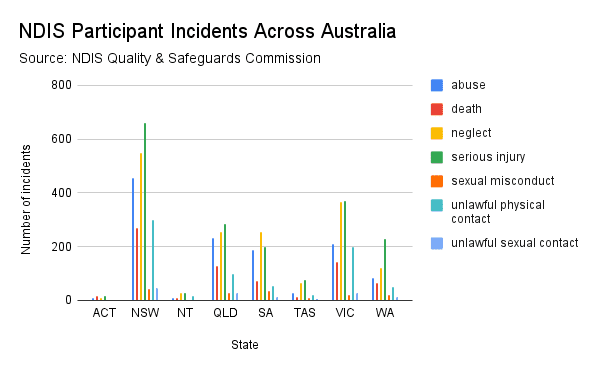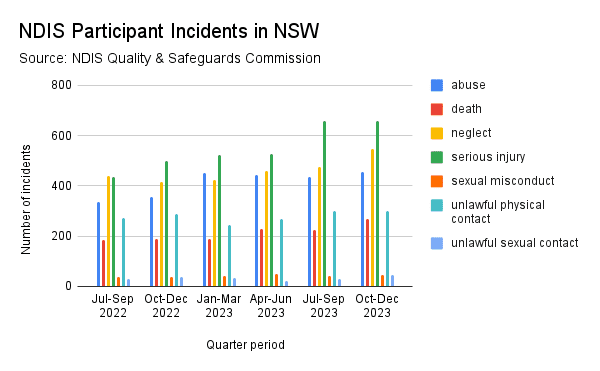There has been an alarming increase in serious incidents against Australians living with a disability who receive funding from the National Disability Insurance Scheme (NDIS), with reports of some suffering from allegations of neglect, abuse and sexual misconduct.
The NDIS Quality and Safeguards Commission’s latest quarterly performance report from October 2023-December 2023 has revealed the increase in a range of serious incidents, as described in the graph below.
The statistics are nation-wide, with NSW higher than any other state.

At the National Press Club last December, Minister for the NDIS Bill Shorten said the incidents were result of a failing system, which the government is striving to restore.
“There are serious issues with accessibility, equity, outcomes, quality, safety, fraud,” Mr Shorten said.
“We cannot have a five-star scheme for the wealthy, professional class and nothing for the poor.
“The NDIS is working hard to improve the experience of participants in the scheme.”
Support worker Jennifer Gardiner first started working with My Team My Way, a registered provider with the NDIS where she was properly trained, before moving to Mable, an unregistered provider which doesn’t require support workers to train.
Mrs Gardiner said Australians who are funded by the NDIS opt for unregistered providers because they are more affordable.
“A lot of clients [from My Team My Way] went to Mable because they wanted a choice of who they wanted to have come and look after them, whereas when you’re with a [registered] provider, the client doesn’t get much choice,” Mrs Gardiner said.
The lack of agency for NDIS participants to select their own support workers means they are more likely to be unsatisfied with their care and therefore make complaints.
Mrs Gardiner said support workers are often put in a difficult position when hired by NDIS participants to complete a two-person job on their own, because hiring more than one carer is too expensive.
“This lady wanted one of her support workers to use a hoist, whereas you need two people to use this, but because she wanted to save on funding, she didn’t want to employ two people to shower him [her husband],” Mrs Gardiner said.
“So this particular lady [support worker] said she wasn’t prepared to hurt her back or even put him at risk, so she ended up leaving, but I don’t know if she reported that back.
“But then you’ll have some people that obviously need the work and don’t want to walk away from a job, so they’ll continue to do it to secure that work.”
The preference for affordable yet unqualified workers provides context for the rising number of incidents that occur while in a support worker’s care.

In March this year, the Albanese government tabled the National Disability Insurance Scheme Amendment (Getting the NDIS Back on Track No.1) Bill 2024, proposing changes to protect participants and give more power to the NDIS Quality and Safeguards Commission.
One of these reforms includes a new taskforce to tackle the overcharging of NDIS participants, chaired by the Australian Consumer and Competition Commission, the National Disability Insurance Agency and the NDIS Quality and Safeguards Commission.
The Bill’s inquiry and report are expected by June 20 this year.

